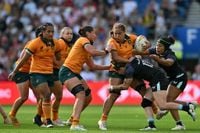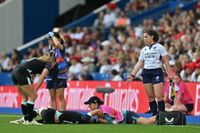England’s Red Roses have powered into the quarter-finals of the Women’s Rugby World Cup, but their 47-7 victory over Australia in Brighton on September 6, 2025, was anything but routine. The win, which cemented England’s place at the top of Pool A and equaled their own record of 30 consecutive Test victories, has set up a mouthwatering showdown against Scotland next Sunday in Bristol. Yet, as the dust settles on a bruising encounter at the Amex Stadium, England’s camp is grappling with a pair of significant injury concerns that could shake up their plans for the knockout stages.
From the opening whistle, Australia—coached by former England captain Joanne Yapp—came out firing. The Wallaroos stunned the home crowd by scoring first, with hooker Adiana Talakai crashing over from a lineout drive. For the first half hour, England looked rattled. Their attack was, as head coach John Mitchell later put it, “clunky, untidy,” and the usually-reliable set piece faltered under pressure. “We didn’t start well, we looked clunky, untidy in attack but I thought our defence was outstanding,” Mitchell said after the match. “Sometimes the attack doesn’t go for you but it was something in our own control so we’ll reflect on our preparation. The defence was outstanding.”
Australia’s early lead held until the 28th minute, but England’s defensive grit began to turn the tide. A pivotal double tackle from captain Alex Matthews and Rosie Galligan on Australia’s Siokapesi Palu, followed by a heroic effort from Abbie Ward, Hannah Botterman, and Sadia Kabeya to hold up prop Eva Karpani, signaled a shift in momentum. Six visits by Australia to England’s 22 in the first half yielded just seven points—a testament to the Red Roses’ defensive steel, a theme that’s echoed throughout their campaign. As vice-captain Meg Jones pointed out, “We know defence is going to win championships.”
Despite their early struggles, England’s attack eventually found its rhythm. Sadia Kabeya and Kelsey Clifford each crossed the try line twice, while Jess Breach, Abbie Ward, and Sarah Bern also touched down. The second half was all England, as they ran in four more tries and tightened their grip on the match. The final scoreline—47-7—may have flattered the hosts, but it underscored their ability to weather adversity and finish strong.
But the win came at a cost. Star full-back Ellie Kildunne, recently crowned World Player of the Year, suffered a head injury in a worrying whiplash incident shortly after the half-time interval. Kildunne, who had struggled to contain the kicking threat posed by Australia’s Faitala Moleka and Caitlyn Halse, was removed from play after showing concussion symptoms. She did not undergo a head injury assessment (HIA) during the game, and under World Rugby’s protocols, must now observe a mandatory 12-day stand-down period. That rules her out of the quarter-final clash with Scotland. “Ellie will go through return-to-play protocols,” Mitchell confirmed. “There is normally a 12-day stand down. She is fine. She’ll be frustrated because she had a difficult day at the office. She’ll get better.”
Kildunne’s absence is a significant blow, given her attacking dynamism and experience at the back. England do have options, though. Helena Rowland, who replaced Kildunne at full-back during the match, is a versatile backline operator and has featured across several positions. Emma Sing, a specialist full-back and outstanding goalkicker, could also step in, while wings Abby Dow and Jess Breach have experience at full-back for their clubs. The coaching staff may also consider reshuffling the backline, with Holly Aitchison’s playmaking skills providing another potential solution.
England’s injury woes don’t end there. Loosehead prop Hannah Botterman was forced off in the first half with an acute back spasm after making 11 tackles in just 24 minutes. Her physicality and work rate have been crucial to England’s forward dominance, and her fitness will be closely monitored in the coming days. Kelsey Clifford, who replaced Botterman, made an immediate impact by scoring two tries off the bench, but the Red Roses’ depth at prop will be tested if Botterman is unable to recover in time.
There was better news regarding Morwenna Talling, who was replaced late in the match after her mouthguard flashed for a head acceleration event. Talling passed her HIA and will be available for selection against Scotland—a relief for England, as she has now made 40 tackles at the tournament without missing a single one. The return of defence coach Sarah Hunter from maternity leave has also been a major boost, with players and staff alike praising her clarity and tactical nous. “When Sunts speaks, people listen,” said Meg Jones. “She’s really clear in the communication that she has and we trust her massively. Whatever she says goes, and we back it as much as we can.”
England’s 93% tackle success rate against Australia, compared to the Wallaroos’ 74%, highlights the difference between the two sides and reinforces the Red Roses’ reputation as one of the most disciplined defensive outfits in the tournament. Yet, the match also exposed areas for improvement. Australia’s kicking game manipulated England’s backfield in ways few teams have managed, and the Red Roses will need to sharpen their anticipation and positioning to avoid similar vulnerabilities against Scotland’s cultured right boot and speedy wings Francesca McGhie and Rhona Lloyd.
Looking ahead to the quarter-finals, England’s meeting with Scotland is loaded with intrigue. The Scots have impressed at this tournament despite off-field contractual challenges, and their style—built around tactical kicking and edge threats—bears some resemblance to Australia’s approach. “Scotland have played really well in this tournament,” Mitchell said. “Considering what they’ve had to experience with the contract conditions, they are doing a remarkable job. They’ve slightly changed their game from the Six Nations. There is some opportunity there that we will look to exploit.”
Elsewhere in the tournament, Australia’s defeat saw them finish second in Pool A, setting up a quarter-final clash with Canada, who earlier beat Scotland 40-19 with Emily Tuttosi scoring twice. The United States thrashed Samoa 60-0 in York, but missed out on the knockout stages, while Fiji’s 28-25 win over Wales marked only their second-ever World Cup victory. South Africa, for the first time, have reached the quarter-finals and will face France in Pool D.
As England prepare for their date with Scotland in Bristol, the focus will be on recovery, tactical refinement, and making the most of their enviable squad depth. The Red Roses have shown they can grind out results even when the going gets tough, but the loss of Kildunne and the uncertainty around Botterman mean they’ll need every ounce of resilience and adaptability to keep their World Cup dream alive. With their defensive backbone and a squad brimming with talent, England remain favorites—but the road to the title just got a little bumpier.



